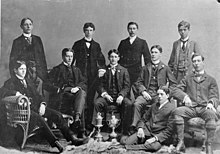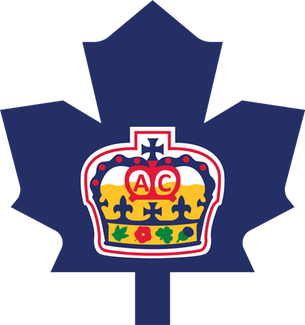
The Toronto Marlborough Athletic Club, commonly known as the Toronto Marlboros, was an ice hockey franchise in Toronto, Canada. Founded in 1903, it operated junior ice hockey and senior ice hockey teams in the Ontario Hockey Association and later the Ontario Hockey League. The Marlboros were a farm team to the Toronto Maple Leafs and one of the dominant junior teams in history, winning seven Memorial Cup championships. The senior team competed for the Stanley Cup in 1904, and won the Allan Cup in 1950. After decline from the late 1970s, the sale of the franchise, and a move away from Toronto, it became the Guelph Storm in 1991.
The Toronto Granites were an amateur senior ice hockey team from Toronto, Ontario. The Granites were Allan Cup champions in 1922 and 1923. They were chosen to represent Canada at the 1924 Winter Olympics in Chamonix, France. The Granites won the second consecutive Olympic gold medal for the Canada national men's ice hockey team.

The Ontario Hockey Association (OHA) is the governing body for the majority of junior and senior level ice hockey teams in the province of Ontario. Founded in 1890, the OHA is sanctioned by the Ontario Hockey Federation along with the Northern Ontario Hockey Association. Other Ontario sanctioning bodies along with the OHF include the Hockey Eastern Ontario and Hockey Northwestern Ontario. The OHA controls three tiers of junior hockey; the "Tier 2 Junior "A", Junior "B", Junior "C", and one senior hockey league, Allan Cup Hockey.

The Winnipeg Victorias were a former amateur senior-level men's amateur ice hockey team in Winnipeg, Manitoba, organized in 1889. They played in the Manitoba Hockey Association (MHA) in the late 19th and early 20th centuries. The Victorias won the Stanley Cup in February 1896, 1901 and January 1902 while losing the Cup in December 1896, February 1899, February 1900, March 1902, and February 1903. After the Stanley Cup became the professional championship, the Victorias continued in senior-level amateur play, winning the Allan Cup in 1911 and 1912.
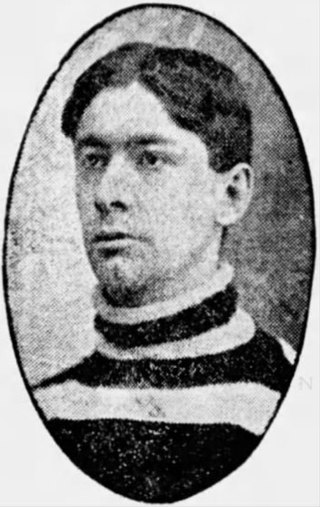
Harry "Rat" Westwick was a Canadian athlete in ice hockey and lacrosse. Westwick – nicknamed the Rat for his small size – is most noted for his play with the Ottawa Hockey Club, nicknamed the Silver Seven during his day, which won and defended the Stanley Cup from 1903 until 1906. He was a member of the Ottawa Capitals lacrosse team from 1896 until 1904, winning three championships. At the time of his final retirement, he was the last professional hockey player active in the 19th century. He was the brother of Thomas Westwick, the father of journalist Bill Westwick, and was inducted into both the Ottawa Sport Hall of Fame and the Hockey Hall of Fame.
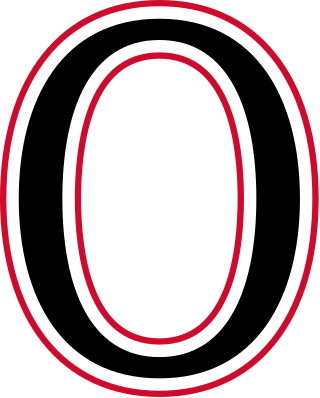
The Ottawa Senators were an ice hockey team based in Ottawa, which existed from 1883 to 1954. The club was the first hockey club in Ontario, a founding member of the National Hockey League (NHL) and played in the NHL from 1917 until 1934. The club, which was officially the Ottawa Hockey Club, was known by several nicknames, including the Generals in the 1890s, the Silver Seven from 1903 to 1907 and the Senators dating from 1908.
The Ontario Rugby Football Union (ORFU) was an early amateur Canadian football league comprising teams in the Canadian province of Ontario. The ORFU was founded on Saturday, January 6, 1883 and in 1903 became the first major competition to adopt the Burnside rules, from which the modern Canadian football code would evolve.
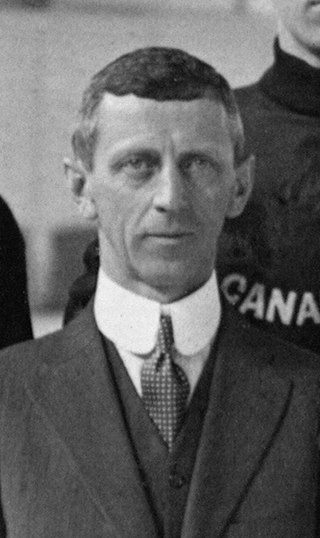
William Abraham Hewitt was a Canadian sports executive and journalist, also widely known as Billy Hewitt. He was secretary of the Ontario Hockey Association (OHA) from 1903 to 1966, and sports editor of the Toronto Daily Star from 1900 to 1931. He promoted the establishment of the Canadian Amateur Hockey Association (CAHA), then served as its secretary-treasurer from 1915 to 1919, registrar from 1921 to 1925, registrar-treasurer from 1925 to 1961, and a trustee of the Allan Cup and Memorial Cup. Hewitt standardized player registrations in Canada, was a committee member to discuss professional-amateur agreements with the National Hockey League, and negotiated working agreements with amateur hockey governing bodies in the United States. He oversaw referees within the OHA, and negotiated common rules of play for amateur and professional leagues as chairman of the CAHA rules committee. After retiring from journalism, he was the managing-director of Maple Leaf Gardens from 1931 to 1948, and chairman of the committee to select the inaugural members of the Hockey Hall of Fame in 1945.

Claude Copeland Robinson was a Canadian ice hockey and sports executive. After winning an intermediate-level championship as captain of the Winnipeg Victorias in 1905, he served as secretary-treasurer and as vice-president of the Victorias. He coached the Victorias to a Manitoba Hockey League championship in 1909, and felt that his team could have competed for the newly established Allan Cup, despite that challenges from senior ice hockey teams were accepted only from Eastern Canada at the time. The Victorias won the Allan Cup by default in 1911, when the Toronto St. Michael's Majors refused to play, then successfully defended four challenges for the trophy.

George Samuel Dudley was a Canadian ice hockey administrator. He joined the Ontario Hockey Association (OHA) executive in 1928, served as its president from 1934 to 1936, and as its treasurer from 1936 to 1960. He was elected to Canadian Amateur Hockey Association (CAHA) executive in 1936, served as its president from 1940 to 1942, as its secretary from 1945 to 1947, and as its secretary-manager from 1947 to 1960. He was secretary of the International Ice Hockey Association from 1945 to 1947, and was later vice-president of the International Ice Hockey Federation (IIHF) from 1957 to 1960. He was expected to become the next president of the IIHF before his death. He graduated from Osgoode Hall Law School in 1917 then practiced law for 43 years as the town solicitor for Midland, Ontario.
The Toronto Aura Lee Hockey Club operated junior ice hockey and senior ice hockey teams in the Ontario Hockey Association (OHA) from 1916 to 1926. They played at Arena Gardens in Toronto. In January 1925, the trustees of the Aura Lee Athletic Club voted to turn their clubhouse and football grounds over to the University of Toronto.

Professional ice hockey (hockey) is the competition of ice hockey in which participants are paid to play. Professional competition began in North America in the United States—in Pennsylvania and Michigan—and in Canada around 1900. Professional ice hockey expanded across Canada and the United States and eventually to many other countries. There are major leagues around the world, including the National Hockey League in North America, the Kontinental Hockey League in Europe and Asia, and the Swedish Hockey League in Europe, as well as minor leagues such as the American Hockey League and ECHL in North America, and the Ligue Nord-Américaine de Hockey in Canada. High-level professional hockey is also present in Germany, the Czech Republic, Slovakia, Finland and Switzerland; professional hockey is also played in many other countries, as diverse as Ukraine, the United Kingdom, Austria, Australia and Japan. The major professional women's league is the Professional Women's Hockey League, which began play in 2024.

The Ontario Hockey Association Senior A League was a top tier Canadian senior ice hockey league in Ontario from 1890 until 1979. The league was sanctioned by the Ontario Hockey Association and the Canadian Amateur Hockey Association and its clubs competed for the Allan Cup.
In Ottawa, Canada, ice hockey clubs date back to the first decade of recorded organized ice hockey play. The men's senior-level Ottawa Hockey Club is known to have played in a Canadian championship in 1884. Today, Ottawa hockey clubs are represented in all age brackets, in both men's and women's, in amateur and professional.
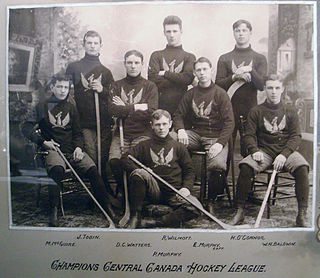
The Ottawa Capitals were the competing clubs of the Capital Amateur Athletic Association (CAAA) of Ottawa, Ontario, Canada. The Association competed in ice hockey, lacrosse and other athletics.

The Toronto Varsity Blues men's ice hockey team is an ice hockey team operated by the Varsity Blues athletics program of the University of Toronto. They are members of the Ontario University Athletics conference and compete in U Sports. The Varsity Blues senior team won the Allan Cup in 1921 and 1927, and won the gold medal for Canada at the 1928 Winter Olympics. The team is based at Varsity Arena on the University downtown campus in Toronto, Ontario.
The Winnipeg Hockey Club were a former amateur senior-level men's amateur ice hockey team in Winnipeg, Manitoba founded in 1890. After the Winnipegs won the 1931 Allan Cup, they represented the Canada men's national ice hockey team at the 1932 Winter Olympics held at Lake Placid, New York. The team was undefeated throughout the Olympic tournament and were named the 1932 Olympic and world champions.

Alfred Ernest 'Cap' McDonald was a Canadian professional ice hockey player who played from 1895 to 1914. In 1912–13, he was the captain and coach of the Sydney Millionaires when they played against the Quebec Bulldogs for the Stanley Cup in 1913.

John Franklin Paxton was a Canadian ice hockey administrator. He served as president of the Ontario Hockey Association (OHA), and was the acting president of the Canadian Amateur Hockey Association during World War I. He ensured that competition for the Allan Cup continued, which saw increased participation from military teams playing senior ice hockey in Canada. He partnered with W. A. Hewitt to negotiate a relationship with the International Skating Union of America to resume hockey games between Canada and the United States that had ended due to the war. Paxton later served as treasurer of the OHA, was a regular delegate to the general meetings of the Amateur Athletic Union of Canada, and represented the old guard of strict principles of amateurism where hockey players did not accept money. He served as the sheriff of Ontario County from 1887 until 1932, and was the son of politician and industrialist Thomas Paxton. After Paxton's death, the Winnipeg Free Press referred to him as both "Canada's most beloved hockey official", and "hockey's most beloved figure".
